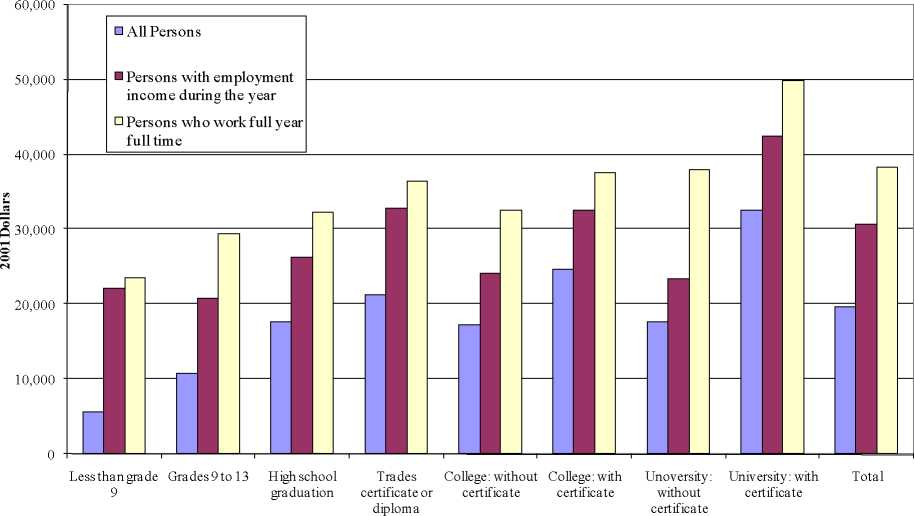25
the most important. This section of the report will first examine the relationship between
education and income using data from the Census. Then, it will briefly highlight some of the
vast literature measuring the extent of the relationship between literacy levels and worker
compensation.
i. Evidence from the Census
Overall, average employment income for all persons 15 and over in Canada was $19,550
in 2001. Among persons with employment income, the average was $30,616 and among those
who worked full time, full year the average was $38,274 (Chart 4). High school graduation
provided a considerable advantage for all groups. On average, Canadians whose highest level of
educational attainment was high school graduation earned $17,557 a year, almost $7,000 higher
than those who went to high school but did not graduate. The average for persons whose highest
level of educational attainment was high school graduation and who received employment
income, the average income was $26,220 while those who worked full time, full year earned on
average $32,204.
Chart 4: Average Employment Income for Persons 15 Years Old and Over, by
Educational Attainment and Employment Status, Canada 2001

Source: Census 2001
Interestingly, persons who, after graduation from high school, continued to post-
secondary education without finishing earn almost the same income on average than those who
did not. However, graduating from college clearly holds an advantage: college graduates earn on
average $24,569 ($32,539 considering only those with employment income and $37,520 for
those who work full time the whole year). University graduates earn even more than college
graduates, $32,538 on average, or $42,343 for those with employment income and $49,825 for
More intriguing information
1. 09-01 "Resources, Rules and International Political Economy: The Politics of Development in the WTO"2. Protocol for Past BP: a randomised controlled trial of different blood pressure targets for people with a history of stroke of transient ischaemic attack (TIA) in primary care
3. An alternative way to model merit good arguments
4. The name is absent
5. The name is absent
6. Second Order Filter Distribution Approximations for Financial Time Series with Extreme Outlier
7. The name is absent
8. Barriers and Limitations in the Development of Industrial Innovation in the Region
9. Outsourcing, Complementary Innovations and Growth
10. Visual Perception of Humanoid Movement